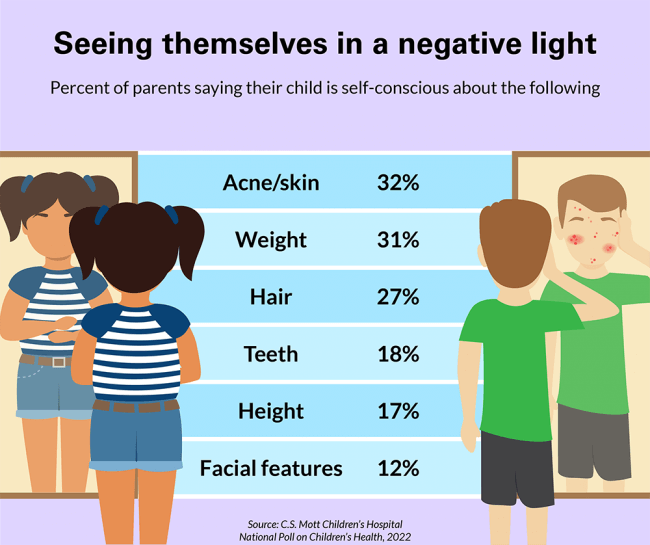ANN ARBOR, Mich. — Mental health issues are a growing concern among young children and teens, according to a new national poll by a team at the University of Michigan. In fact, two in three parents say their child feels insecure about their appearance. One in three parents say their child has been bullied or made fun of because of their looks.
“Children begin forming opinions about their bodies and looks at a very young age,” says Susan Woolford, MD, MPH, a child obesity expert and pediatrician at the University of Michigan Health C.S. Mott Children’s Hospital and Mott Poll co-director, in a university release. “These findings reinforce research that as kids receive unhealthy messages about societal ideals, it can lead to a poor self-image of themselves. Left unchecked, a preoccupation with appearance and body dissatisfaction may lead to decreased mental health and emotional well-being and increase risks for eating disorders, depression, and low self-esteem.”
Feeling uncomfortable about looks and appearances can negatively impact an adolescent’s self-esteem and potentially breed body image issues. In the poll, one in five parents say their teenage children dislike taking pictures because they feel self-conscious.
The C.S. Mott Children’s Hospital National Poll surveyed 1,653 parents with at least one child between the ages of eight and 18. Common reasons for these insecurities included weight issues, skin conditions such as acne, and dissatisfaction with their hair. Parents note that their children were less likely to feel awkward about their height or facial features. However, one in five parents of girls add their child felt self-conscious about their breasts.

Being a teen can be the most difficult time
Parents were more likely to report that their child felt insecure about their appearance when they were a teenager in comparison to when they were eight to 12 years-old.
“As kids get older, they become more self-aware, are more likely to compare themselves to peers, and may be more influenced by media portrayals about beauty and the most desirable body shape, face, and look,” says Dr. Woolford. “It’s developmentally normal for adolescents and teens to experience some insecurities, but if it’s interfering with their ability to enjoy social interactions or other activities, they may need help.”
About a third of parents observed their children making negative comments about their looks. For parents with self-conscious children, one in three believe their appearance likely is impacting the child’s self-esteem. Another one in five parents think their child’s low self-confidence is hindering them from taking part in certain activities.
Especially with teens, parents say their child tries to remedy the situation by actively avoiding being in photos, covering themselves with clothing, or restricting what they eat. Those insecurities may be fueled by negative comments coming from others. One in three parents says their children’s appearance has been mocked or commented on by their peers, strangers, or other family members. The most common parental response is to talk about the incident. Parents were less likely to actively shield their child from the person making the hurtful statements or the person making the comments.
How can parents change the body image conversation?
Based on the findings, Dr. Woolford recommends that parents follow these suggestions. First, role model self-love by not making negative comments about their own appearance and instead vocalize appreciation for the powerful things your body does, such as taking you on walks or swimming.
“Kids are watching every time you step on that scale and sigh about needing to lose weight or point out your own perceived flaws in the mirror,” the researcher says.
Second, teach children how to embrace body diversity positively, whether in person or on television. However, Dr. Woolford says you should avoid giving compliments on a person’s beauty. Even if well-intentioned, the praise reinforces the message that physical appearance is important.
Families should also work towards redefining what it means to exercise and get good nutrition. Shifting the mindset from eating and working out for the purpose of looking good to feeling good may help with preventing unhealthy dieting in the future. Having regular family meals can also keep parents connected to kids and encourage an open dialogue on what’s going on in their lives.
Lastly, parents should limit social media usage to avoid comparisons to unrealistic, filtered photos from influencers and celebrities.
“Parents can teach their children to be media literate and savvy, so they understand that these portrayals of the perfect body, face and look in advertisements, media and even from their own friends doesn’t reflect reality,” Woolford concludes. “By laying a strong foundation of healthy attitudes, parents can help their children develop a positive body image through youth and adulthood.”
